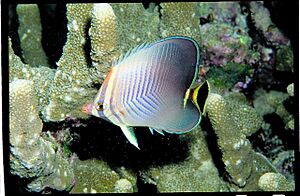Triangle butterflyfish facts for kids
Quick facts for kids Triangle butterflyfish |
|
|---|---|
 |
|
| Conservation status | |
| Scientific classification |
|
| Kingdom: | Animalia |
| Phylum: | Chordata |
| Class: | Actinopterygii |
| Order: | Perciformes |
| Family: | Chaetodontidae |
| Genus: | Chaetodon |
| Subgenus: | Chaetodon (Gonochaetodon) |
| Species: |
C. triangulum
|
| Binomial name | |
| Chaetodon triangulum Cuvier, 1831
|
|
| Script error: The function "autoWithCaption" does not exist. | |
| Synonyms | |
|
Gonochaetodon triangulum (Cuvier, 1831) |
|
Script error: No such module "Check for conflicting parameters".
The triangle butterflyfish (Chaetodon triangulum) is a beautiful fish that lives in the ocean. It's also called the herringbone butterflyfish. This fish is a type of butterflyfish, which are known for their bright colors and interesting patterns. It is a ray-finned fish, meaning its fins are supported by bony spines. You can find this fish in the warm waters of the Indian Ocean.
What Does It Look Like?
The triangle butterflyfish has a body that looks flat and shaped like a triangle. This shape is very clear when its fins are spread out wide. It also has a long snout, which is like a nose.
Its body is mostly whitish. It has many wide, vertical grey bands on its sides. These bands look like chevrons, which are V-shaped patterns.
The fish's mouth is orange. There's also a brownish-orange band that goes through its eye. This band gets brighter orange near the top of its head. It also gets wider as it goes back towards the base of its dorsal fin (the fin on its back).
The part of its body just before its tail, called the caudal peduncle, is black. Its tail fin is also black, but it has yellow edges. This fish has 11 to 12 spines and 23 to 26 soft rays in its dorsal fin. Its anal fin (the fin on its belly) has 3 spines and 20 to 21 soft rays. The triangle butterflyfish can grow up to about 16 centimeters (6.3 inches) long.
Where Does It Live?
The triangle butterflyfish lives in many places across the Indian Ocean. You can find it along the coast of tropical East Africa. It also lives eastwards, all the way to the Andaman Sea.
It is found along the Indian Ocean coasts of Sumatra and Java, which are islands. This fish has also been seen near the Seribu Islands and close to Bali.
Home and Habits
The triangle butterflyfish lives in lagoons and reefs that face the open ocean. It really likes to be near corals, especially a type called Acropora. This includes staghorn corals, which look like deer antlers.
These fish are very territorial. This means they defend their living space. They usually live in pairs. However, young fish that are still growing often hide alone among the coral branches.
Triangle butterflyfish are special because they are "obligate corallivores." This means they must eat coral to survive. They mainly eat Acropora corals. They protect their patches of these corals very carefully. They will even chase away other butterflyfish that try to come into their territory and eat their food.
Who Discovered This Fish?
The triangle butterflyfish was first officially described in 1831. A French scientist named Georges Cuvier (1769-1832) gave it its scientific name. He noted that the first fish of this type was found near Jakarta.
 | Selma Burke |
 | Pauline Powell Burns |
 | Frederick J. Brown |
 | Robert Blackburn |


